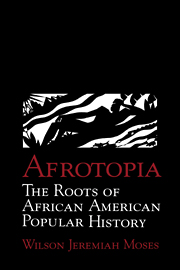Book contents
- Frontmatter
- Contents
- Acknowledgments
- Dedication
- 1 Introduction
- 2 Varieties of Black Historicism
- 3 From Superman to Man
- 4 Progress, Providence, and Civilizationism
- 5 W. E. B. Du Bois and Antimodernism
- 6 Afrocentrism, Cosmopolitanism, and Cultural Literacy in the American Negro Academy
- 7 Caliban's Utopia
- 8 Barbarism Grafted onto Decadence
- 9 Conclusion
- Notes
- Index
2 - Varieties of Black Historicism
Issues of Antimodernism and “Presentism”
Published online by Cambridge University Press: 10 November 2009
- Frontmatter
- Contents
- Acknowledgments
- Dedication
- 1 Introduction
- 2 Varieties of Black Historicism
- 3 From Superman to Man
- 4 Progress, Providence, and Civilizationism
- 5 W. E. B. Du Bois and Antimodernism
- 6 Afrocentrism, Cosmopolitanism, and Cultural Literacy in the American Negro Academy
- 7 Caliban's Utopia
- 8 Barbarism Grafted onto Decadence
- 9 Conclusion
- Notes
- Index
Summary
Sentimental Afrocentrism
“Afrocentric” was defined in 1962 by the secretariat of the Encyclopedia Africana for the purpose of distinguishing a geographical focus from a racial focus. W. E. B. Du Bois, director of the project, had earlier written that his idea was “to prepare and publish an encyclopedia not on the vague subject of race, but on the peoples inhabiting the continent of Africa.” Du Bois seems to have settled on the term as he attempted to clarify the relationship of the project at hand to other projects that he had proposed or attempted to initiate over the preceding fifty-three years.
In 1909 Du Bois wrote to the venerable West African nationalist Edward Wilmot Blyden, the nineteenth-century prophet of the idea of “African Personality,” who many think of today as the father of the Afrocentric idea, proposing an Encyclopedia Africana, but little came of that proposal. Du Bois began a project for an “Encyclopedia of Colored People” in 1934, but that too failed for lack of funds. Both of these early plans manifested a Pan-African or black diaspora orientation, and Du Bois proposed to treat the history and status of all people of African descent, throughout the world. Du Bois obviously wrestled for many years with the concept of an African-centered project, how it should relate to racial propaganda, and whether it should center on the entire black race or on the geographical entity of Africa.
- Type
- Chapter
- Information
- AfrotopiaThe Roots of African American Popular History, pp. 18 - 43Publisher: Cambridge University PressPrint publication year: 1998

